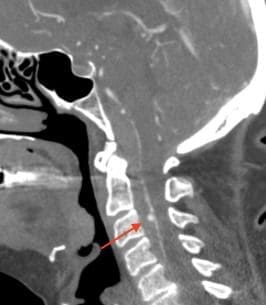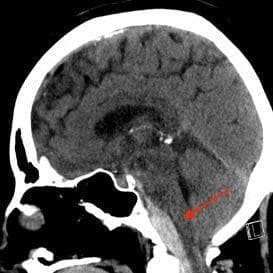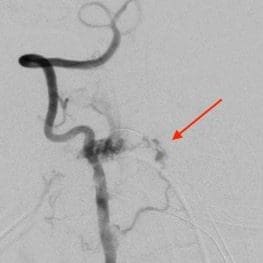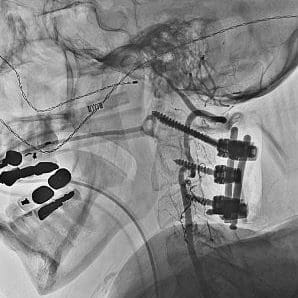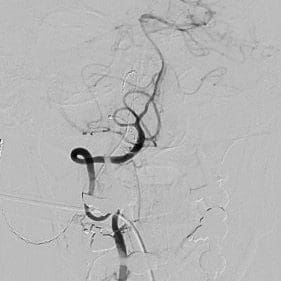
Two days after completing a cross-country road trip in October 2022, Cynthia Brooks was settling in at her home in Middleville, Michigan when she began to feel ill.
“I had numbness and weakness on one side of my body,” she recalled. “My husband thought I was just sick, but my daughter convinced me to call 911.”
At University of Michigan Health-West Hospital, doctors spotted an arteriovenous fistula, or tangle of veins and arteries on Cynthia’s brain stem. The fistula in a critical blood vessel had caused two strokes. Working against time, Drs. Bryan Figueroa, surgical director of the UM Health-West Stroke Center, and Fazeel Siddiqui, interventional neurologist and co-director of interventional neuroradiology at UM Health-West were able to embolize, or glue, the fistula to prevent it from catastrophically bursting.
But Cynthia had a long road to recovery ahead at UM Health-West and Mary Free Bed Rehabilitation Hospital, where she needed to regain strength and relearn how to walk.
“I was hospitalized for 87 days and had a tracheotomy. I couldn’t lift either arm and my left side was very week.”
Armed with faith, determination and a positive outlook, Cynthia began to make slow but steady progress. “If I didn’t help myself, I wasn’t going to get better. So, I put in the work.”
Cynthia said staff at both hospitals encouraged her to keep pushing ahead, one recovery milestone at a time.
“The first time I walked with a walker in the ICU, everyone stopped and clapped, and it felt so good. It felt warm and comforting to know they cared,” she recalled.
Through physical therapy, she was able to regain mobility and have her tracheotomy removed before being discharged.
“There were so many blessings along the way. Every time there was a setback, the glass would be half full.”
In July 2023 during a routine cerebral angiogram, doctors found that the fistula had redeveloped.
“Drs. Figueroa and Siddiqui said I could be sent to Ann Arbor for surgery, and I thought that is so far away.” So, she opted for surgery closer to home. “I had had such a good experience at UM Health-West, I thought, let’s stay here and do it.”
Doctors performed an image-guided perioperative embolization followed by craniocervical excision of the fistula to remove it definitively. This time Cynthia was able to leave the hospital after just three days.
“Knowing the warning signs of a stroke and taking immediate action can mean the difference between life and a devastating disability,” explained Dr. Figueroa. “Cynthia’s remarkable recovery shows the importance of knowing the signs and acting fast.”
Dr. Figueroa says the acronym BE FAST can be a life-saving tool. “Balance loss, eye changes, face drooping, arm weakness, speech difficulty—these are the warning flags of stroke. And the ‘T’ is for time, because each second counts.”
Now, Cynthia’s outlook on life is one of resilience and gratitude and she plans to return to UM Health-West in May 2024 for knee replacement surgery, preparing for an active life.
“We’ve traveled to Florida. I swim and I drive still,” she explained. “I am a new, different me.”
Looking back on her recovery, she sees a silver lining. “My journey isn’t over. Hopefully my case can save someone else along the way.”
